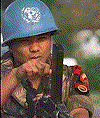Introduction
On 27th April 1961, Sierra Leone became independent from the UK, becoming the Republic of Sierra Leone.
In 1996 the presidential and legislative elections suffered from widespread rigging in favour of the SLPP (Sierra Leone Peoples Party) which was acknowledged by the National Election Commission while international monitors declared the elections largely fair and free despite violent tactics by the RUF (Revolutionary Party Front) attempting to disrupt the elections.

On 25th May 1997 there was a military coup that asked a jailed Major Johnny Paul Koroma to be their leader. The military junta did not attract international support and was not welcomed by the Sierra Leone people and the Nigerian-led Economic Community of West African States Monitoring Group (ECOMOG), aided by Sierra Leone Civil Defence Forces (CDF), removed the military junta from power in Freetown in February 1998 and the Kabbah returned from Conakry to power on 10th March 1998.

Rebel attacks continued and most of Freetown was occupied by the rebels on 6th January 1999; ECOMOG eventually forced them out but over 5,000 people were killed during the rebel invasion and occupation. A ceasefire was agreed in May 1999 and on 7th July 1999 the Lome Peace Agreement was signed. The agreement provided blanket amnesties for crimes committed prior to the signing, a ceasefire monitoring, the RUF's transformation into a political party, security guarantees, disarmament of combatants, the return of prisoners of war, humanitarian assistance, four cabinet posts opened to the rebels, restructuring of the armed force and the withdrawal of mercenaries.
The Lome Peace Agreement collapsed in May 2000 when the RUF took 500 UN peacekeepers hostage and killed a number of others as well as some journalists. In December 2000, the RUF stepped up its attacks on Guinea despite a ceasefire. By late 2000, 13,000 UN peacekeepers were protecting the capital and key towns in the south of the country.

UK forces were deployed on 7th May 2000 in response to evacuate UK citizens and secure the airport so that UN reinforcements could be flown in. Under its emergency powers the government arrested the leader of the RUF and over 100 RUF personnel.
Following the stabilization of the situation, the UK forces were drawn down to about 300 personnel of the short-term training team, and administrative support backed up by a naval force off shore. The UK government also agreed to supply the Sierra Leone government with 10 million rounds of ammunition for rifles and four thousand mortar shells.



